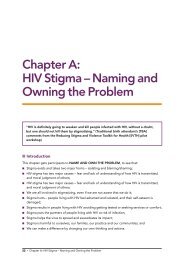Implementing Multiple Gender Strategies to Improve HIV and ... - ICRW
Implementing Multiple Gender Strategies to Improve HIV and ... - ICRW
Implementing Multiple Gender Strategies to Improve HIV and ... - ICRW
You also want an ePaper? Increase the reach of your titles
YUMPU automatically turns print PDFs into web optimized ePapers that Google loves.
Evaluation Results<br />
Project reach: LVCT moni<strong>to</strong>ring data from 2004 show that:<br />
• 4,000 survivors of sexual violence have been seen at partner health<br />
facilities.<br />
• 802 health care workers have been trained (490 female, 312 male).<br />
• 202 police officers have been trained (59 female, 143 male).<br />
• 101 local administra<strong>to</strong>rs have been sensitized (36 female, 65 male).<br />
• 482 community stakeholders have been sensitized (269 female, 213<br />
male).<br />
Replication <strong>and</strong><br />
Scale-up Activities<br />
From the three original sites the project has scaled up <strong>to</strong> 12 districts.<br />
Also, a costing study has been finalized in conjunction with the Ministry of<br />
Public Health <strong>and</strong> Sanitation Division of Reproductive Health, which<br />
demonstrates the ability of government <strong>to</strong> take on the program <strong>and</strong> scale<br />
up services.<br />
LESSONS LEARNED AND CHALLENGES<br />
Key Findings <strong>and</strong><br />
Lessons<br />
• Using multiple gender strategies enhances referrals <strong>and</strong> replicability<br />
<strong>and</strong> ensures gender is addressed in all trainings. Accounting for gender<br />
issues ensures that sexual violence is not seen as a “women’s issue,”<br />
but as a societal issue that affects all.<br />
• In addition <strong>to</strong> direct services for survivors, it is important <strong>to</strong> consider<br />
targeted interventions for the community, the police, health providers,<br />
<strong>and</strong> policymakers.<br />
• <strong>Gender</strong>-based programming is a long-term issue that needs <strong>to</strong> be<br />
integrated broadly in various trainings <strong>and</strong> education institutions.<br />
• Community support of the program is crucial.<br />
• Post-rape clients who access counseling early are more likely <strong>to</strong><br />
adhere <strong>to</strong> <strong>HIV</strong> prevention drugs.<br />
• There is a need <strong>to</strong> develop health care <strong>and</strong> legal guidelines for<br />
managing survivors of sexual violence.<br />
• A national policy framework on gender-based violence is necessary <strong>to</strong><br />
link post-rape services with other relevant programs.<br />
Challenges <strong>and</strong><br />
Unforeseen<br />
Outcomes<br />
• Survivors of sexual violence may be reluctant <strong>to</strong> seek health services<br />
out of fear that the case may end up in the formal courts.<br />
• Many survivors do not report incidents of sexual violence. Reporting<br />
such an experience could reduce a woman’s chances of getting<br />
married <strong>and</strong> increase the possibility of being ostracized by the rest of<br />
the community.<br />
• There are minimal reliable <strong>and</strong> relevant data on sexual violence.<br />
67
















